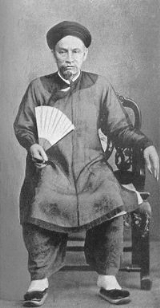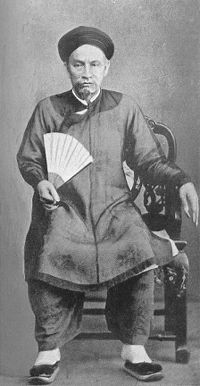
Nguyen Van Tuong
Encyclopedia

Mandarin (bureaucrat)
A mandarin was a bureaucrat in imperial China, and also in the monarchist days of Vietnam where the system of Imperial examinations and scholar-bureaucrats was adopted under Chinese influence.-History and use of the term:...
of the Nguyễn Dynasty in Vietnam. He is known for installing and dethroning three emperors in 1883–84: Dục Đức, Hiệp Hoà
Hiep Hoa
Emperor Hiệp Hòa was the sixth emperor of the Vietnamese Nguyễn Dynasty and reigned for four months...
, and Kiến Phúc
Kien Phuc
Kiến Phúc was an 7th emperor of Vietnam in the 19th century. Born in 1869, he was the nephew-turned-adopted son of Emperor Tự Đức...
.
Biography
Tường was born in 1810 in Quảng TrịQuang Tri
Quảng Trị is a town district of Quang Tri province in the North Central Coastal region of Vietnam. Significantly, it was the only South Vietnamese provincial capital to be captured by the North Vietnamese forces for a limited period in the 1972 offensive....
, in central Vietnam, to a peasant family. His father had been involved in a revolt against the Nguyễn Dynasty rule, so he was barred from competing in the national examinations that were used to select mandarins and court officials.
On October 29, 1848, Emperor Tự Đức ascended the throne. The imperial records do not record how Tường initially came into contact with Tự Đức, but they do show that under the emperor's protection, Tường was able to pass the national examinations with the highest honours. In 1852, Tường was assigned to serve in the ministry of justice. In accordance with Confucian tradition, following the death of his father in 1862, Tường had to retire for a five year mourning period before resuming his administrative career.
Since 1858, France had been steadily making inroads into Vietnamese sovereignty. In 1873, Tự Đức gave Tường the responsibility of negotiating with the French. Despite his record of reaching agreements, the French regarded him as a cheat. After signing the Philastre treaty and recovering possession of Hanoi following the attack by Francis Garnier
Francis Garnier
Marie Joseph François Garnier was a French officer and explorer known for his exploration of the Mekong River in Southeast Asia.- Early career :...
, Tường was promoted to be of Minister of Domestic and Foreign Affairs. In 1881, he became head of the cabinet.
When Tự Đức died, Tường was made regent together with Tran Van Thanh and Tôn Thất Thuyết
Ton That Thuyet
Tôn Thất Thuyết was the leading mandarin of Emperor Tự Đức of Vietnam's Nguyễn Dynasty. Thuyết later led the Can Vuong movement which aimed to restore Vietnamese independence under Emperor Hàm Nghi. He was born on May 12, 1839 in Huế....
. Thuyết and Tường dominated the court and had much more power than Thanh. The regents were not the only ones with power behind the throne. Dowager Empress Từ Dũ, the mother of Tự Đức, along with the two imperial consorts Trang Y and Hoc Phi
Hoc Phi
Học phi was a wife of Emperor Tự Đức of the Nguyễn Dynasty of Vietnam. She is best known for her involvement in palace intrigues following her husband's death....
formed what were known as the Tam Cung (Three harems), a triumvirate that dabbled in palace intrigue. To complicate things further, Tường was having an affair with Hoc Phi.
Tự Đức had no sons, but he had adopted three of his nephews. Dục Đức was 31 years old and the son of Kien Thoai Vuong, Tự Đức's fourth brother. Chánh Mông (who went on to rule as Đồng Khánh) and Duong Thien (who went on to rule as Kiến Phúc
Kien Phuc
Kiến Phúc was an 7th emperor of Vietnam in the 19th century. Born in 1869, he was the nephew-turned-adopted son of Emperor Tự Đức...
), aged 19 and 14 respectively, were sons of his twenty-sixth brother Kien Thai Vuong.
According to research by the Vietnamese historian Pham Van Son, Tự Đức had intended that Kien Phuc would succeed him, but that the regents installed Dục Đức under pressure from the Tam Cung. Tự Đức had criticized Dục Đức's morality in explaining his appointment of Kiến Phúc, information that the regents deleted from the will at the request of the new monarch. However, the regents were unimpressed by Dục Đức's behaviour after their reprieve and decided to execute him. The treatment of Dục Đức has since raised speculation among historians that it was a vengeance killing because of the monarch's interference in the affair between Tường and Hoc Phi.
Tường and his colleagues then installed the 37-year-old Hiệp Hoà. However, the new emperor was aware of their faults, so he decided to steer clear of them. As a result, they wanted to dispose of him. Hiệp Hoà then made a deal with the French so that they would protect him, fearful of the regents. However, when the French were absent, the regents put Hiệp Hoà to death. They then replaced him with Kiến Phúc.
However, Kiến Phúc caught Tường with Hoc Phi and vowed to kill them for their conduct. Before he had an opportunity, Hoc Phi put poison into his medicine and he died the next day.
Eventually, Hàm Nghi
Ham Nghi
Emperor Hàm Nghi ; , was the eighth Emperor of the Vietnamese Nguyễn Dynasty. He reigned for only one year ....
was installed as the emperor, and Thuyết decided to launch the Cần Vương
Can Vuong
The Cần Vương movement was a large-scale Vietnamese insurgency between 1885 and 1889 against French colonial rule. Its objective was to expel the French and install the boy emperor Hàm Nghi as the leader of an independent Vietnam...
movement, an uprising against the French. Thuyết took Hàm Nghi to a mountain base at Tan So
Tan So
Tan So was a secret military base in central Vietnam that was built in the 1880s. It was built up by Tôn Thất Thuyết, the regent of the Nguyễn Dynasty, in preparation for an uprising against French colonialism....
, and then went to China to hide and seek reinforcements. In the meantime, the French installed Đồng Khánh on the throne.
The French gave Tường two months to bring Hàm Nghi to heel, and when the boy emperor continued to resist, they deported Tường on September 6, 1885, to Poulo Condore, along with the father of Thuyết, Tôn Thất Thuyết
Ton That Dinh (mandarin)
Tôn Thất Đính was a mandarin of the Nguyễn Dynasty who served under Emperor Tự Đức. He was the governor of Hải Dương Province...
. Tường continued to plot while in prison, and was caught sending out instructions for more revolts. The French resident superior seized his property and found 14.5 million piastres.
On November 23, 1885, Tường was deported to Tahiti
Tahiti
Tahiti is the largest island in the Windward group of French Polynesia, located in the archipelago of the Society Islands in the southern Pacific Ocean. It is the economic, cultural and political centre of French Polynesia. The island was formed from volcanic activity and is high and mountainous...
in the Pacific Ocean where he died in February 1886. In July, his body was returned to his family in Huế
Hue
Hue is one of the main properties of a color, defined technically , as "the degree to which a stimulus can be describedas similar to or different from stimuli that are described as red, green, blue, and yellow,"...
.

